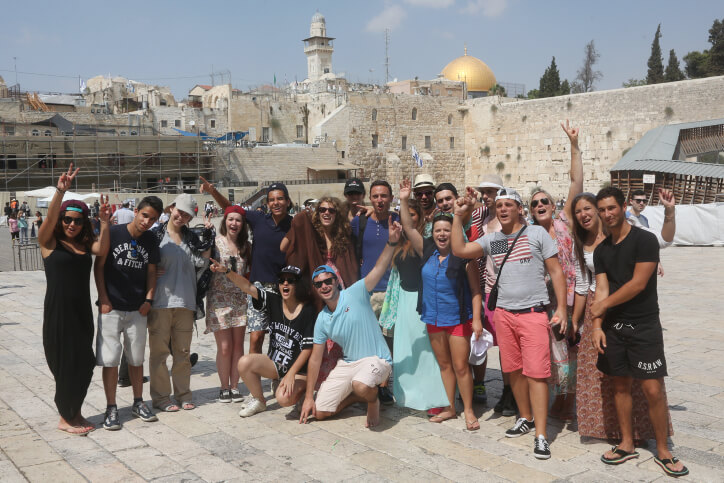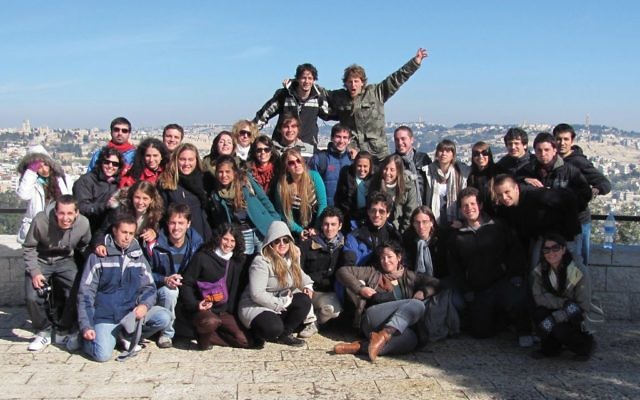
Birthright program contributed over $1 billion to Israeli economy, study showsNEW YORK – The Birthright Israel program, which provides free trips to Israel for young Jews across the world, has contributed $1.1 billion to the economy since it begun in 2000, according to a study by the firm Ernst & Young.The figures show that the gross contribution was made both directly and indirectly. The direct contribution of Birthright Israel to the economy, which consists of paying for hotels, tourism suppliers, flights and educational activities, amounts to $840 million. The indirect contribution, consisting of participants’ expenses, such as food, beverages, souvenirs, trip extensions and returning trips, amounts to $325m. Ernst & Young’s report also showed that Birthright Israel participants make up 12% of the tourists visiting Israel from June to August and December to January, and that while the Israeli tourism sector is often affected by the security situation, Birthright participants growth remains steady, highlighting that most Birthright groups arrive in the off-season and therefore balance supply and demand. In addition, Birthright Israel participants were found to be significant drivers of small businesses in Israel, with 47% of Birthright overnights taking place in peripheral areas in Israel, in locally owned accommodations, compared to only 28% of overnights for overall incoming tourism. “This new report validates the success of our program and reinforces one of our main goals: to have participants return to Israel and foster relationships with its people throughout their lifetime,” Birthright Israel CEO Gidi Mark said. Mark predicts that Birthright will “have an even greater impact on Israel in the near future, as participants decide to work at Israeli companies or start businesses of their own in Israel.” The data from the study project an additional gross contribution from Birthright to the economy until 2020 estimated at $770m. Since its founding 15 years ago, Birthright Israel has provided free trips to more than 500,000 Jews aged 18 to 26, with the goal of “strengthening Jewish identity, facilitating cultural understanding and fostering solidarity with Israel and its people.” We Are Waiting For You – The Kotel | Birthright IsraelBirthright Israel 03april2020 |
Birthright Israel
Taglit is the Hebrew word for discovery. During their trip, participants, most of whom are visiting Israel for the first time, are encouraged to discover new meaning in their personal Jewish identity and connection to Jewish history and culture.[2] Since trips began in the winter of 1999, more than 500,000 young people from 64 countries have participated in the program.[3][4] About 80% of participants are from the United States and Canada. The number of participants has not grown beyond 40,000 a year due to budgetary constraints.[1] |
|

‘Birthright brings more young people than any other Jewish organization in the world’Prominent American Rabbi Shmuley Boteach defends Birthright Israel, saying left-wing organizations unfairly attack it. “To see people experience Israel for the first time – it is an amazing thing,” he says as he accompanies group of 40 participants.by Dan Lavie Published on 2019-09-04 https://www.israelhayom.com/2019/09/04/birthright-brings-more-young-people-than-any-other-jewish-organization-in-the-world/ It’s not every day that you see a prominent American rabbi lead a group of young Jews on a tour of Israel, but this is what “America’s rabbi,” Rabbi Shmuley Boteach, is doing these days. Boteach, a rabbi, bestselling author, TV host, and public speaker, is known for his efforts to bring Jews closer to their heritage. He also heads The World Values Network, an organization that promotes universal Jewish values. This week he has been accompanying a group of participants on a 10-day tour organized by Birthright Israel (Taglit), an organization dedicated to bringing young Jews on short visits to Israel. “Birthright brings more young people [to Israel] than any other Jewish organization in the world. The [pro-Israel US lobby] AIPAC reaches many people who are in their 30s, 40s, and 50s. Chabad reaches people all over the world, but young people [are a hard demographic to reach],” Boteach told Israel Hayom this week as he toured Israel with the group. “[They] come to Israel and they have no connection to Israel whatsoever, many don’t even have any connection to Judaism. So I think it is very important to me, as a rabbi, as a Jew, and especially as someone who loves Israel, to be connected to this program. To be with young people, to experience Israel with them, to see Israel with them, it is the right thing to do.” Boteach, who spoke to Israel Hayom as the group of some 40 participants traveled to their next destination Israel on a bus, “About 99% of them came to see how they interact with Israel, how they connect to Israel, how they absorb Israel. It’s a very inspirational thing; it’s an uplifting thing; it’s a spiritual thing. Most of us who love Israel – and who either live here or who have visited many times, sometimes we think it’s magic because we are used to it, but to see people experience it for the first time – it is an amazing thing.” Boteach said that what motivated him in coming to Israel on this trip was his hope that he would be “able to offer something in terms of Judaism, in terms of my love for Israel, in terms of defending and protecting and standing by Israel.” He added that “on top of that, I really wanted to come on Birthright because it is under attack; you have people who are infiltrating Birthright groups, they’re encouraging young people to lie and to get on the trips so fraudulently, and there’s a lot of fraudulent stuff going on.” Boteach was referring to efforts by left-wing organizations to undermine the Birthright Israel program because of the way it presents the Arab-Israeli conflict to participants. “I have no issue with political differences; I have no issue with political disagreements, that’s the beauty of democracy. I have an issue with [one of the organizations critical of Birthright], which is encouraging people to lie that they want to go on a Birthright trip when really they want to go to disrupt the trip,” Boteach said. “They want to go to ruin the trip, so how is that acceptable? [Nowadays], I’m involved in communications and media, so when I heard last year what was happening with Birthright, I really wanted to show my support and to participate. [The attendees] are not fans of President Donald Trump, and they may not be fans of the policies of Prime Minister Benjamin Netanyahu either, that’s about 70%. About 30% support Trump, and love Netanyahu.” |
Birthright: Why the Controversy?By Margo Dickstein June 17, 2019 https://honestreporting.com/birthright-why-controversy/ In recent years, controversy about Birthright-Israel has been making headlines. Birthright has been accused of being a mouthpiece for a right-wing Israeli government and donors. Some claim Birthright gives a one sided Zionist-centered view of Israel while ignoring the situation for Palestinians in the West Bank and Gaza, as well as non-Jews living within the Green Line. There are differences in opinions of those who criticize the organization. Some call for a complete boycott of Birthright trips to Israel, while others simply wish to include more education about the conflict in the itinerary. So, what is Birthright, why the controversy, and is it accomplishing its goals? A Brief HistoryBirthright began in December of 1999 out of concern that rising assimilation in the diaspora was leading to disengagement with Jewish life and the State of Israel. The idea of a free trip to Israel for every Jewish young adult came about in 1994 through Yossi Beilin, Israel’s Deputy Foreign Minister at the time. To date, Birthright has given the opportunity to 650,000 Jewish young adults to travel throughout Israel for free. In Birthright’s own words, their trips have three educational focuses at their core:
A unique aspect of the Birthright trip compared to other trips to Israel is the IDF soldiers who act not as security, but as participants on the trip. This experience is known as the Mifgash. This is a key part of how Birthright creates connections between diaspora Jews and Israelis. The Israeli soldiers on Birthright trips are often the same age as the participants and relate to things like tastes in music and common young adult problems. Birthright participants leave the trip with new connections to the State of Israel and new Israeli friends. Why is there Birthright Controversy?Controversy around Birthright gained major media attention in the summer of 2018, when a small number of participants decided to walk off the trip, claiming that Birthright was giving them only a one-sided view of the conflict. They wanted to talk to Palestinians and visit the West Bank, which is not included in Birthright’s itinerary. Controversy also surrounds Sheldon Adelson, a major supporter of President Donald Trump and Prime Minister Benjamin Netanyahu. Due to his forthright political views, some see Birthright simply as a mouthpiece of the Israeli government and the right-wing. So, are these young Jewish activists right? Is Birthright simply a mouthpiece for a right-wing view of Israel? In order to understand the Birthright controversy, you have to go back to its founding. Birthright was born during a time of immense hope for peace, in between the peace accords that became known as Oslo I and Oslo II. During that time, Yossi Beilin traveled to the United States in his role as Deputy Foreign Minister, and became concerned about the continuity of the Jewish people outside of Israel. His idea was to “create a wide network of young Jews from around the world and from Israel, to increase awareness of the common Jewish story, not as a religion but as extended family.” Related reading: I Teach at Birthright. IfNotNow is Wrong. When he shared his idea, he faced backlash from the government and the Jewish Agency, who wanted more money to be invested into Israel’s periphery, not to “rich American students.” Wealthy philanthropists who would eventually become major funders of Birthright called the plan unrealistic and unsustainable. Birthright only came into being five years later, under another left-wing government led by Ehud Barak. Between 2006 and 2007, Sheldon Adelson, then known most for being a wealthy casino magnate, donated $60 million dollars to Birthright in order to open spots for 24,000 participants who had been on a waiting list due to Birthright’s exploding popularity. From that point on, he became Birthright’s biggest donor, donating millions of dollars to keep up with Birthright’s growing participation. Birthright has maintained that Adelson has no impact on the trip itinerary. Adelson is joined by a variety of other donors from all over the political spectrum. Despite their deep ideological differences, they come together in their support for Birthright because of the trip’s apolitical nature. Who Decides the Itinerary?Birthright doesn’t operate its own trips. It utilizes independent trip organizers such as Hillel International, Chabad, and other independent providers to run trips for them. Even as Birthright grew and new donors joined, including its biggest contributor Sheldon Adelson, Birthright did not change how it operates its trips. All trips must visit a Jewish heritage site, a Zionist heritage site, a contemporary national heritage site, a “natural” heritage site, and a Shoah (Holocaust) heritage and learning site. These requirements give Birthright trips significant flexibility, allowing individual providers to offer unique themed trips including:
In 2016, wanting to include more voices in the Israel conversation, Birthright added a mandatory two-hour lecture on geopolitics of the region, as well as including opportunities to talk to Israeli-Arabs. This has caused controversy from some on the right, calling the inclusion of Arab voices unnecessary to include in the Birthright itinerary. Remaining ApoliticalDespite calls from left-wing groups such as IfNotNow and J-Street that Birthright is a right-wing organization, Birthright maintains that it is apolitical. However, left-wing groups claim that by not taking students to places like checkpoints and the West Bank, they are inherently being political. Let’s be honest: Birthright knows its audience. College campuses are more polarized than ever. In an annual survey of first year college students taken by the Cooperative Institutional Research Program at the University of California, Los Angeles in 2016, a little over 42 percent of incoming college freshmen defined themselves as politically “middle of road,” the fewest percentage of moderates since the annual survey’s inception more than fifty years ago. The report also calls the 2016 incoming class “the most politically polarized” in its history. If the goal of Birthright is to ensure Jewish continuity in the midst of a rising tide of assimilation and intermarriage, while at the same time appealing to a wide range of polarized political views, then the only solution is to not be political. If going to a settlement would anger liberals, and visiting a checkpoint would anger conservatives, then the only solution is to do what would satisfy the greatest number of people: Don’t do either. Real ResultsThe Jewish Futures Project (JFP) is a long-term study on the impact of Birthright. It is conducted by the Maurice and Marilyn Cohen Center for Modern Jewish Studies at Brandeis University. Its latest report in 2017 showed that Birthright is accomplishing the goals of its founders, outweighing any controversy connected to Birthright. Key Findings of the Study:
If the goal of Birthright is to ensure the continuity of the Jewish people, and studies show it is accomplishing its goals, then Birthright has no real incentive to change its itinerary, and why should it? From its inception, Birthright has claimed to be an apolitical trip, focusing on connecting diaspora Jews to Israel and the Jewish people. The focus is not and should not be the conflict. Some Concluding Thoughts…Something must be said about Birthright loud and clear: No one is forced to go on Birthright. Birthright is just what it is described as – a gift that every Jewish young adult is entitled to. Just like any gift, one can politely decline. Birthright also gives every participant the opportunity to extend their trip for a small cost and stay up to three months, during which participants are free and unrestricted to travel to places within Israel proper and the West Bank, talking to whomever they wish. There are plenty of low-cost programs that offer opportunities to travel to settlements, Palestinian cities and villages, and checkpoints in the West Bank. Information about these programs is just a Google search away. In the social justice world, people often speak of privilege: white privilege, male privilege, etc. What about the privilege of Jewish identity? Of having had the ability to grow up learning about who you are and about Jewish values and history. Birthright is about equalizing that privilege. Leveling the playing field for all Jews, so that everyone has an opportunity to experience what it is like to be a part of a people – the Jewish People. Surely the opportunity Birthright provides outweighs any controversy. Jerusalem Cats Comments: So if you don’t have a Jewish Education and a Jewish Tradition growing up in a Jewish household celebrating the Shabbat and ALL the Jewish Holidays (not just a quick Passover Seder), how do you know what being Jewish is? No wonder these kids who are part of IfNotNow and other who boycott Birthright, will gravitate to anything but real Judaism. They were raised as Jews-In-Name-Only without the true meaning of what being Jewish is. Judaism is not “Just the Holocaust”, getting Drunk on Purim and a quick Passover Seder. You have a rich 3400 year history to learn and enjoy. They are being “Hijacked” by Antisemitic, Anti-Israel, Hamas Terrorist supporting, BDS Supporting Leftist “jewish” groups such as J-Street, IfNotNow, Jewish Voice for Peace and other groups. They have turned into Jewish sheeple, Do you know what happens to sheeple? sheepleshee·ple |

Examining Jewish identity and Israel engagement on Birthright’s 20th anniversaryWorking with experts to create programming that is emotionally, physically, and intellectually engaging, the program is continuously navigating how to achieve its objectives with a diverse and ever-changing population of Jewish adults.by Eliana Rudee , JNS , Israel Hayom Staff Published on 05January2020 https://www.israelhayom.com/2020/01/05/examining-jewish-identity-and-israel-engagement-on-birthrights-20th-anniversary/ 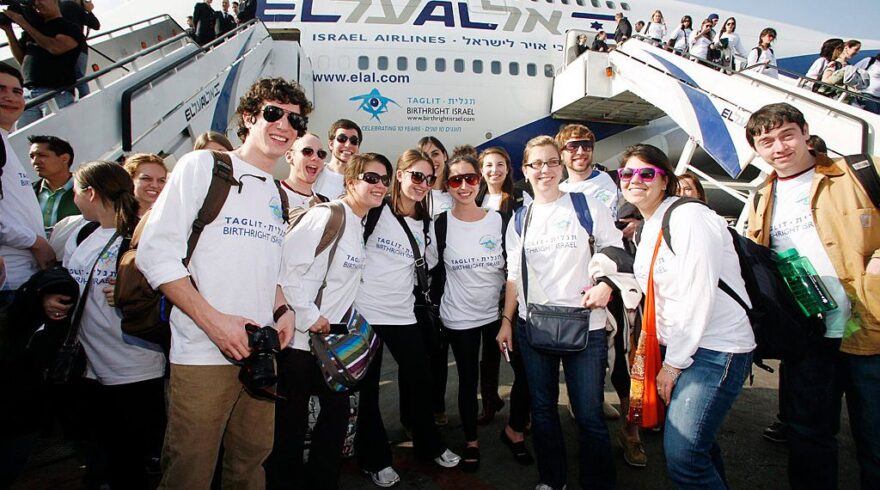 Participants of the Taglit-Birthright Israel flight pose for a picture as they arrive at Ben-Gurion International Airport | Photo: Courtesy This month, Taglit-Birthright will celebrate a major anniversary, representing two decades of the 10-day-trips that have impacted the lives of more than 750,000 emerging Jewish adults worldwide. The program was founded by Jewish philanthropists Charles Bronfman and Michael Steinhardt, with support from private donors and the Israeli government, to spur involvement by North American youth who were becoming increasingly dissociated with their Jewish roots. It initially was geared for ages 18 to 26, though the target age has been extended. While young Jews around the world can participate, the large majority have been those from the United States and Canada. Len Saxe, who in his role as professor of contemporary Jewish studies at Brandeis University has written extensively on the impact of Birthright, told JNS of “the enormous impact that the program has on the lives of people who participate.” By comparing those who have applied for and participated in Birthright, versus those who applied but did not participate, Saxe has traced the lives of various groups of participants six, 12, 18, 24 and 36 months post-program to find that “Birthright is a pivotal movement that changed the trajectory of engagement with Jewish life.” According to his “conservative estimates through complex modeling,” those who go on a Birthright trip are 50% more likely to marry another Jew and raise Jewish children. Additionally, Jewish identity, connection to a Jewish community, and connection to Israel each increase significantly more for those who participated. Upon returning to Portland State University from his Birthright trip in winter 2015, Cole Keister found that “BDS [had come] to campus” through a motion by the “very anti-Israel” student government that passed the movement to boycott Israel by 23-3. “The language they were using was off the normal BDS script,” he told JNS. “They were calling out Jewish people and weren’t even being anti-Israel, just straight up anti-Semitic.” Birthright, he said, catapulted his journey to becoming president of the Israel group on his campus following the onslaught of anti-Israel and anti-Semitic sentiment there. “I have created dozens of events and collaborations with other student groups, [such as] Sikhs, African student associations, and more,” he said. “I have learned to be a leader. I went on Birthright, and now here I am.” According to Saxe, Keister’s story is not an outlier. Most participants, he said, come with positive views on Israel, and even those who are critical of the policies of the Israeli government typically express a strong connection to the Jewish state. “Participants start out with a fairly high connection and association. And this is what is remarkable about Birthright – it is deeply enhanced by the experience. Those who were connected to Israel become very connected,” he noted. “There are a relatively few number of people who come feeling completely disconnected from Israel, and that number after they come back is very, very small.” Jewish identity and involvement are also “enormously impacted,” affirmed Saxe. “Birthright alumni are overrepresented in terms of incidence in the population as professional staff in Jewish Federations and careers in the Jewish world, including those who did not go to Jewish day school or had much involvement in the Jewish community early on.” The participants who witness the biggest transformations, according to the researcher, are those who had poorly formed Jewish backgrounds in early life, with little to no exposure to formal and informal Jewish education. ‘Part of something greater than myself’In winter 2018, Tennessee native Natalie Dubin concluded her Mayanot Birthright Israel trip with a better understanding of what it means to be a Jew, as well as a stronger desire to become more involved with the Jewish community back home. With barely any Jewish education growing up, in 2019, Dubin reported still feeling “connected” and “changed,” with her trip inspiring her to explore her background further and even wear a Jewish star to express her pride in her identity. After returning to Asheville, N.C., where she works as a speech therapist, Dubin recalled talking to everyone at work about the experience and how “it was much more than I could have ever expected.” “I raved to my friends about how I fell in love with the people in Israel and how amazing I found the Jewish religion to be,” she told JNS. “Friends would ask if I claim to be Jewish or not, and I tell them I’m not a religious person, but I am Jewish,” she declared. That represented a marked difference, she added, compared to a year-and-a-half prior to the trip when she wouldn’t “advertise” her religion. The Israeli soldiers who participate, too, are “in many ways as profoundly affected as the Diaspora participants,” reported Saxe. “It is interesting how similar they describe the experience. They say, ‘I came into the program as an Israeli in the army, protecting my country, and I came out feeling not just as an Israeli but a Jew, part of something greater than myself and my community.'” “It is clear that Birthright is transformative,” he summarized. Working with psychologists and experts in education to create programming that is emotionally, physically, and intellectually engaging, Birthright is continuously navigating how to achieve its objectives with a diverse and ever-changing population of emerging Jewish adults who represent a range of geographies, backgrounds, and education. Two decades after its founding, the program’s central challenge “in a world of pathological individualism,” summed up Saxe, is to continue to hone in on how to make the best use of the 10 days to “provide a Jewish identity experience that reinforces the notion that we are connected to one another and part of something greater than ourselves.” Reprinted with permission from JNS.org. The Adelson family, which has donated hundreds of millions of dollars to Birthright Israel, owns the company that is the primary shareholder in Israel Hayom. |

Birthright CEO addresses alienation from Israel by Diaspora youthGidi Mark says the trip is not designed to deal with political issuesBy Jeremy Sharon 28December2018 https://www.jpost.com/Opinion/Birthright-CEO-addresses-alienation-from-Israel-by-Diaspora-youth-575649 The Birthright Israel program has had tremendous success in the nearly 19 years since it was founded in 1999, bringing hundreds of thousands of young Jews from North America and across the Jewish world to Israel to bolster their Jewish identity and connection with the Jewish state. In total, some 600,000 young Jewish men and women from the Diaspora have been on the free 10-day trips Birthright provides, constituting an impressive 7.5% of the global Jewish population outside of Israel. And research demonstrates that participants in Birthright trips have an increased affinity to Israel and are more inclined to find a Jewish spouse, raise their children Jewish and get involved in Jewish communal activity. This summer, there were 32,400 Birthright participants from across the Jewish world, along with 6,500 Israelis participating in the tours, while another 15,500 Diaspora Jews will participate in tours during the winter season. A 7% drop in numbers is expected for the 2018 winter season over the 2017 figures, although this is a far smaller decrease than has been reported. But two challenges have surfaced of late. The first is the troubled relationship between the Israeli government and the Diaspora Jewish leadership over some key issues relating to the state’s Jewish identity that have blown up over the last couple of years, over the Western Wall, conversion, and similar issues. The second, a direct challenge to Birthright, has been a campaign led by a left-wing Jewish group protesting against what it sees as Birthright’s failure to sufficiently address Israel’s conflict with the Palestinians and its control of the West Bank, during its tours. SPEAKING WITH The Jerusalem Post before the current winter season of Birthright trips began, Birthright director Gidi Mark talks about how more than 100,000 Israelis have participated in the tours alongside the participants from the Diaspora, and emphasizes the importance of creating this mass of Israelis who have friends and direct connections to Jews and Jewish communities abroad. He also addresses the walkout demonstrations that gained significant media coverage and were seen as a symptom of alienation from Israel among liberal-minded Diaspora Jewish youth. Several Birthright groups during the course of this summer were, to all intents and purposes, infiltrated by activists from the IfNotNow organization, who during the course of their trip declared that they were dissatisfied with how the Israeli-Palestinian conflict was discussed and demonstrably walked out. They were filmed by co-activists and the event was live-streamed on social media for maximum effect, after which they went to participate in activities relating to Palestinian life in the West Bank and east Jerusalem. And there was a similar incident earlier this week in which IfNotNow activists were removed from a tour while trying to discuss the security barrier with their tour guide and filming him during the discussion. IfNotNow has described the trip as “a bribe” to Jewish youth by Birthright’s benefactors, especially Sheldon Adelson, a patron of the Israeli and American right-wings, whereby they are given a free trip to Israel to bolster their Jewish identity and connection to Israel but are shielded from the realities of Palestinian life, and thus they ignore a critical issue that the Jewish state is caught up in. First and foremost, Mark insists, Birthright is an educational organization dedicated to providing an educational experience to its participants, and is not designed to deal with political issues. “We refuse to turn Israel into something which is 99% political and 1% Jewish life,” he says. And, he argues, the organization seeks to be as inclusive as possible, and must take into account all sides of the political map, not just one perspective. But he also seeks to put the issue into perspective, pointing out that out of the approximately 40,000 participants in the summer tours, just 13 engaged in a walkout, on just three separate occasions. “This was mainly a media-directed provocation. The press took this anecdote of the 13 and wrote more reports on them than the 40,000 other participants,” he says somewhat indignantly. He declines, however, to venture an opinion as to how reflective of Diaspora Jewish youth the IfNotNow walkout demonstrators are. Nevertheless, he insists said that concerns regarding the conflict with the Palestinians are also addressed during Birthright tours, despite claims to the contrary. “We show their point of view, just like we show the opposite side as well; we present the spectrum that reflects the Israeli consensus and the massive distances [between them],” he says. Birthright’s critics argue that the trips do not focus enough on the Israeli-Palestinian conflict, but Mark insists that the organization dedicates “a fitting proportion of time to the issue which is appropriate for an educational experience.” And, he insists again, Birthright is about Jewish identity and connection to the Jewish state, and does not have political goals. “We very much do not want to turn Birthright into a political experience,” he says. “With all due respect, if they want to organize their own groups, they can do so, but they can’t come to us and demand that we do the programs they want. They can’t hijack an educational program and say ‘We want to turn it into a political program.’” Mark says there are two hours of time on Birthright trips dedicated to discussing the conflict, but beyond that opines that participants often have the most in-depth conversations on big issues during the travel time on the tour buses between stops, which he says amounts to some 40 hours over the 10 days, with the Israeli participants and the tour guides on the trip. “The biggest way participants can understand what is happening here is through interacting with Israelis, and often the most important communication is informal discussions on the bus with Israelis on the program, and among themselves, where every topic is discussed, and there’s no censor.” Nevertheless, Jewish youth in North America, Birthright’s biggest target audience, are largely liberal-oriented and increasingly are concerned with Israeli rule in the West Bank, the enlargement of settlements and the treatment of the Palestinians. Critics of Birthright have argued that by giving the conflict scant attention, the program will become less relevant for Jewish youth who often connect their Jewish identify to liberal notions of social justice. Mark responds by saying that Birthright has developed hundreds of niche tours, including those that deal with Israeli societal issues and include meeting with Israeli Arabs and other sectors of the population, as well as LGBT groups, all-women tours, needs-based groups such as those for people with physical and mental disabilities, and many others besides. “There are many groups which come to Israel in the role of fact finders and similarly where the majority of their agenda is political issues. Someone who wants a political group can go on Google and find lots of such groups, and they are welcome to go on them,” says Mark sharply. Birthright has also started to actively deal with the “walkout” phenomenon. Those who left tours during the summer were required to pay for their plane ticket back home, and new clauses were inserted into the contract for the winter season warning of possible consequences for participating in a demonstrative walkout. The new clause states: “Efforts to coerce, force or suppress opinions, hijack a discussion or create an unwarranted provocation violate Taglit-Birthright Israel’s founding principles and will not be permitted.” Mark does not directly relate to the new clause, but opines that the walkouts are “preplanned provocations” and says that “someone who wants to be a provocateur needs to pay for his ticket himself. “We pay fully for the tours which we receive from very generous donors so that someone can fulfill their right for an educational experience in Israel. If someone wants to say they don’t want to have this educational experience but, rather, wants to exploit it for a political provocation, I’m not willing to give him a free plane ticket.” AWAY FROM the issue of the walkouts, Mark is eager to emphasize the contribution of Birthright to building bridges between Israelis and Diaspora Jews, specifically by having a smaller number of Israelis participate in every trip alongside the participants from abroad. In total, some 100,000 Israeli youth have been on Birthright trips, 90,000 of whom were still in the army and on a sanctioned break from their IDF service, as part of a deliberate policy of affording young Israelis the opportunity to get to know Jews from abroad. “When Birthright began nearly 19 years ago, there were very few Israelis who knew Jews from the Diaspora,” says Mark. “They are target No. 1 as much as the others. They are not ‘accompanying’ the others or security staff, they are participants. Their need for familiarity with a Jewish experience is no less for them than those coming from abroad.” Mark says that there are now some 9,000 Israelis participating every year in Birthright trips, “a division, in the army’s terms,” he quips. Despite the negative headlines about a rupture between Israel and the Diaspora, be it due to the actions of the government on religion and state, or a perceived divergence of values between Israelis and Diaspora Jews, Mark insists that claims there is a disconnect are not accurate. “There has never been a situation in which 100,000 Jews living in Israel had at least one friend living abroad, and 600,000 Jews in the Diaspora who had at least one friend in Israel,” he said of the sheer mass of Birthright participants from Israel and the Jewish world abroad. Mark argues that many of the Israeli participants are already entering public service and will positively impact the way the state relates to and deals with its brethren abroad. He talks of the “development of a quiet reality” in spite of “headlines which sometimes are taken out of proportion,” and says that Israelis and Jews in the Diaspora can learn from one another’s successes. “We shouldn’t turn this into a war. There isn’t a war. Both sides have great strengths, and both sides can learn from each other and improve. We’re not perfect here, and they are not perfect there. “We should never forget that we came from the same nuclear family, and every contact between Israelis and Diaspora Jews is crucial. “Birthright has made a living bridge, spanning continents, which 700,000 people have crossed, and this has never happened before.” |

Birthright co-founder: Don’t criticize Israel on our nickelBirthright Israel co-founder Charles Bronfman says young Jews are free to criticize Israel, but not while enjoying a free trip. Birthright Israel co-founder and billionaire philanthropist Charles Bronfman said on Wednesday that young Jews are free to criticize Israel, but not while enjoying a free trip, JTA reported. “If people want to call Israel names and say bad things about the country, they certainly have the right to free speech. But they don’t have the right to do it on our nickel,” he was quoted as having told Haaretz in an interview. His comments came after at least two groups of American Jews visiting Israel on the 10-day trip left the tour to join leftists groups on visits to Palestinian Arabs. The walk-offs reportedly were encouraged by the leftist American-Jewish group IfNotNow. The young Jews who walked off the trip and some others who remain on them are critical of what they say is Birthright’s failure to deal with Israel’s alleged “occupation” of Judea and Samaria. Some have complained that maps handed out to participants do not draw a proper distinction between Israel and Judea and Samaria. Bronfman said in his interview with Haaretz that participants on Birthright can extend their trip and join any kind of group they want or travel on their own to areas controlled by the Palestinian Authority. “If they want to go to the West Bank or Gaza, they are certainly free to go,” he was quoted as having told Haaretz. “What is not fair is making a big tzimmes while the trip is on. Frankly, I just don’t think that is fair to their fellow participants,” added Bronfman. He noted that the Birthright experience includes four hours devoted to discussing the situation between Israel and the Palestinian Authority as impartially as possible. “I don’t see the issue not being addressed,” he said. Before one of the walk-offs from the trip, far-left anti-Israel activists from the IfNotNow organization attempted to recruit Birthright participants departing from New York’s Kennedy Airport. Birthright-Taglit aims to connect young Jews to the state of Israel and their Jewish identity through a free ten-day tour of the country. |

Birthright Hits Back After New DisruptionsContract clause added about ‘hijacking’ trip; activist urge ‘diversity of viewpoints’ on the Israeli-Palestinian conflict.By Stewart Ain 2January2019 https://jewishweek.timesofisrael.com/birthright-hits-back-after-new-disruptions/?fbclid=IwAR1Tk-YXDQFSsgn13k2wj4PNyP_uhgh697I7FMKf4ITeJ4eLxsYiEP2Hcec It began last June 18 with five members of IfNotNow being ejected from Kennedy Airport for encouraging Taglit-Birthright participants to ask about Israel’s treatment of Palestinians. Ten days later, five IfNotNow activists walked off a Birthright trip after complaining that their questions about the occupation were not welcome. Less than a month later, eight more IfNotNow activists walked off a Birthright trip. Birthright leaders condemned those actions. But now, in an escalation of the tensions between IfNotNow activists and the group that organizes free trips to Israel, Birthright recently added a new clause in the Code of Conduct section of its contract that all participants must sign. It states that “to ensure the trip’s overall integrity and educational mission … (it will not permit efforts) to manipulate its open climate.” Those attempting “to coerce, force or suppress opinions, hijack a discussion or create an unwarranted provocation” face ejection from the trip. That clause was enforced for the first time last week during the fifth day of the free 10-day trip after three IfNotNow activists on the trip began asking about Israeli treatment of Palestinians. One of the three, Emily Bloch, 29, of Boston, told The Jewish Week that she had asked the guide about Israel’s West Bank separation or security wall when their bus passed it. “He talked a little about it without mentioning the effect the wall has on the lives of Palestinians,” she recalled. “He talked for a long time about what the wall meant for Israelis and why it was erected. He said crazy terrorists would come across the border, and said all Israelis wanted to be able to work freely … in a safe environment. I asked if we were going to hear any other perspectives; I wanted to hear what life was like for Palestinians. … He said he didn’t know of anyone who would be able to do that. “Then another person [on the trip] jumped in and asked about nuanced views, and another person was filming it all,” Bloch continued. “The whole trip was being filmed, but this was the first time it was an issue. … The tour guide got in the face of the person who had been filming and said stop filming; he yelled at her.” Bloch said that portion of the film was then deleted and the three of them were told they were being ejected from the tour. 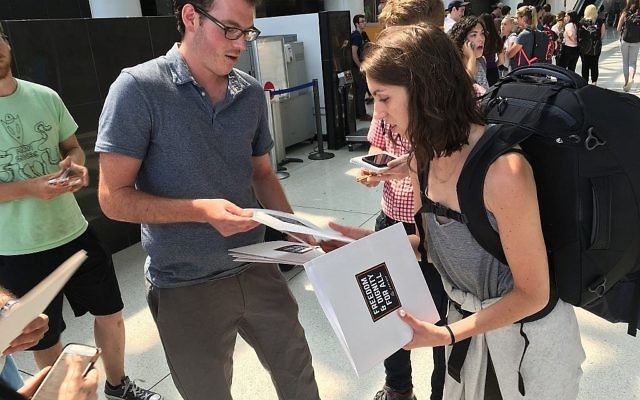 An IfNotNow member distributes materials to a Birthright participant in New York’s JFK airport, Monday, June 18, 2018. (Steven Davidson via Times of Israel) An IfNotNow member distributes materials to a Birthright participant in New York’s JFK airport, Monday, June 18, 2018. (Steven Davidson via Times of Israel)“They said they felt like Birthright was not able to meet our needs,” she recalled. “We said our needs are to hear a diversity of viewpoints and they said they could not meet our needs on this trip. … I wanted to hear from Palestinians or anybody with a different perspective. Asking questions is the most Jewish thing somebody can do.” Bloch added that unlike the 13 IfNotNow activists last summer, she had not planned to walk off from the tour. Alyssa Rubin, a spokesperson for IfNotNow, said Birthright was “using this Code of Conduct to silence discussion about the occupation. She [Bloch] asked about the relationship between the border wall and the wall [Donald] Trump wants to build. It seems the conversation escalated and less than two hours later they were being asked to leave the trip. They knew each other before [the trip] and made the decision to go knowing that Birthright is not open to these conversations. But they wanted to go and challenge Birthright to open up to this conversation. They did not expect that asking a single question would get them expelled from the trip. … They got in touch with us after they were kicked off.” But Gil Troy, the lay chair of Birthright Israel’s international education committee, insisted that the three, as well as the other 13, “came with a specific agenda … to hijack the conversation for their own political aims. … We discovered this summer that we have to protect the group of 40 from the politics of the three. If you come with an agenda, you have stolen a free trip from someone else who wanted to come with an open heart.” Contrary to Bloch’s claims, Troy said he cannot believe the three were ejected from the trip for asking one question. “Birthright tour educators are not stupid,” he said. “It’s incomprehensible to me that simply asking one question would get someone thrown off the program. Since December 1999, do you really think more than 650,000 participants have gone on Birthright trips and have come home happy and challenged and inspired by having their intelligence questioned? I have engaged in those conversations myself. There is no question you can ask that is unacceptable. If we don’t ask the rough questions here, where will we?” 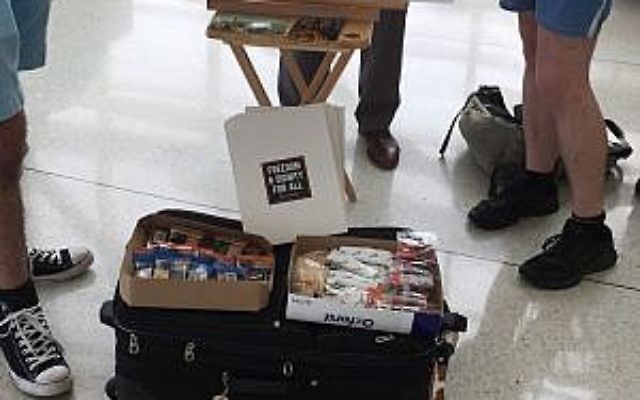 The IfNotNow display targeting Birthright participants at New York’s JFK airport, Monday, June 18, 2018. (Steven Davidson/ Times of Israel) The IfNotNow display targeting Birthright participants at New York’s JFK airport, Monday, June 18, 2018. (Steven Davidson/ Times of Israel) The Israeli newspaper Haaretz said it found that some of Birthright’s key trip providers have experienced a drop in attendance of from 20 to 50 percent this winter season (December through March) compared to a year ago. Along with Bloch, Shira Tiffany of Boston, who was filming the tour, and Ben Doernberg of Virginia were the other two participants ejected. Doernberg tweeted about it, writing that the tour guide had “launched into a monologue about Palestinian suicide bombers and put 100% of the blame on them [Palestinians].” He said they had asked about “the lack of nuance and whether we’d be getting any perspectives from any Palestinians, or people who advocate for Palestinian rights. … “I can’t think of anything less Jewish than to kick someone off for asking questions, for wanting to hear multiple perspectives, for caring about the freedom of everyone who lives in Israel/Palestine. …Demanding that young Jews keep their values quiet in exchange for plane tickets is not a gift, it’s a bribe.” A group of Birthright participants pose during their trip to Israel. New ideas for improving Israel-diaspora relations include a Wikimedia Commons “The agenda of Birthright is clear — to build a Jewish family. I do not love the Birthright authorities, but to blame Birthright and its managers and donors is unacceptable to me. There is no chance in the world they were kicked off the trip just because they asked questions. … If you don’t want the gift, don’t take it. Nobody is forcing anybody to come. But if they do, they need to have a little bit of respect.” Bloch said that after they were told they were being ejected from the trip, they were told they had broken “the rules and regulations. We asked which ones” and didn’t get an answer. A spokesman for Birthright said in a statement: “When activists aggressively disrupt the experience of the other participants then, like in any organized group experience, we have to ask them to leave regardless of their agenda. Birthright Israel always welcomes participants’ views and questions, which are essential to the success of the experience, so long as they are shared in a constructive and respectful manner. We will not condone any coordinated plans to ruin the experience for others in order to promote a specific agenda.” |

First ‘Birthright for business executives’ trip takes in IsraelWhere a program that sponsors college students’ visits to the Holy Land leaves off, the AlmaLinks group aimed at entrepreneurs steps in “Through AlmaLinks activities including parlor meetings, lectures, social events, and now organized tours, we try to instill and promote a positive relationship between the two sides.” AlmaLinks started out five years ago as an informal network of Israeli and US young executives who were looking for a way to keep the friendships they had made in Israel alive. Today, AlmaLinks is a network of over 600 outstanding young CEOs and executives in 10 global chapters. It is led by businesspeople and financiers who decided to form an organization focused on Israel and the Jewish people. The guest list at a typical AlmaLinks event is a who’s who of the Israeli business community. One recent event included over 50 CEOs and founders of some of the largest high-tech startups in the country, and similar events in the US, South Africa, and other places where the group is active hosted a similarly accomplished list of guests. “For 60% of our members, AlmaLinks is the first Israeli or Jewish organization they have been involved with, and many of our unaffiliated members haven’t been able to make it to Israel yet due to the heavy workload that comes with building a business,” said Sapir. “AlmaLinks fills that gap, providing opportunities to meet with and connect to like-minded Israelis, and come face-to-face with the business leaders who are driving the Israeli economy.” Last month, AlmaLinks sponsored its first Diaspora delegation visit to Israel. The group saw the sights — Beit Hatfutsot, the Museum of the Jewish People; the Jerusalem ultra-Orthodox neighborhood of Mea Shearim; the Western Wall — as well as the inner workings of several startups, with participants (who are in the tech business themselves) getting a first-hand look at how Israeli firms operate. Among the executives the group met with were Ziv Aviram, CEO and founder of Mobileye, Haim Neerman, founder of Credorax and FabrixTV, Noam Shomron, founder of Variantyx, a cutting-edge genome diagnostic company; and Yaron Ben Shaul, CEO of Vernet and Hometalk. For some participants, AlmaLinks programs are a transformative experience. Amanda Bresler of PW Communications, one of the largest business development and proposal writing firms on the East Coast, said that, having been raised in a Reform household in suburban Washington, “I had no real Jewish network to speak of. While I had never had any strong desire to visit Israel, I was nearing the end of my eligibility for Birthright and figured that, given I already had the time off, I may as well take advantage. I went on Birthright in December 2014, and while I was in Israel, I quickly recognized that the country has an amazing energy and ability to produce brilliant solutions.” Bresler decided that her company needed to be active in Israel, but had no idea how to proceed – until she got involved in AlmaLinks. The group, she said, “has connected me to hundreds of people around the world, who I count among not only my business contacts but also my personal friends. AlmaLinks ‘shows’ Israel to a group of people who, in many instances, are otherwise disconnected from the country. As a Jew who lives in the Diaspora, I know firsthand how easy it is to live well and productively, without ever engaging in Israel. The other organizations I would come across in New York and elsewhere in the US try to bring you into the ‘fold’ in Israel, by leading with a religious message. That message works for some, but not for a growing population of American Jews — Jews, like me, who are largely secular and are more likely to derive a meaningful connection to Israel through business/networking opportunities.” For Israeli members, AlmaLinks brings a refreshing change to the usual connection that they have with Disapora Jews. Israeli business magnate Victor Vaisleib said, “’Old-school’ Israeli groups plead with American Jews to either make aliyah or to donate money, and both approaches have long been controversial and polarizing. In fact, in the 21st century they’re simply irrelevant. Israel as a springboard for young leaders at their career prime is a value-based concept that makes a lot of sense in today’s environment.” Long-term, it remains to be seen what the real effect of AlmaLinks will be on Israel-Diaspora business ties, said Vaisleb, but Sapir is optimistic. “What AlmaLinks provides is the platform, at a local and a global level, to grow and sustain that spark of excitement about Israel’s business, high-tech, and entrepreneur community. Our aim is to foster that excitement among the talented young professionals who, as they take up leadership positions in their industries, will keep in mind Israel and the Jewish community.” |






